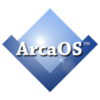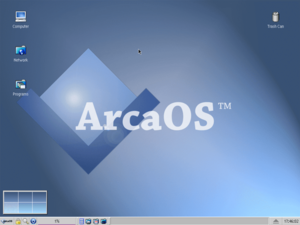ArcaOS
ArcaOS is an operating system developed and marketed by Arca Noae, LLC derived from OS/2, based on the last release by IBM.[1] Development continues with a stated goal to add wider compatibility for more modern computing platforms, including UEFI and GPT support. It has limited PAE support (RAM in excess of 4 GB is utilized as a RAM disk[2]) and utilizing its SMP kernel, supports up to 64 physical CPUs or real CPU cores (Hyper-threading is not recommended[3]).
 | |
 ArcaOS 5.0.5 desktop | |
| Developer | Arca Noae based on code from IBM, Microsoft, and other various developers |
|---|---|
| OS family | OS/2 |
| Working state | Current |
| Source model | Closed source |
| Latest release | 5.0.5 / June 06, 2020 |
| License | Proprietary software with open-source components |
| Official website | www.arcanoae.com |
ArcaOS is a 32-bit operating system that runs on the x86 processor architecture (real or virtualized). ArcaOS is based on IBM's OS/2 Warp 4.52 (also known as Merlin Convenience Pack 2 or MCP2).[4][5] As of version 5.0.4, ArcaOS is ACPI 6.3-compliant to ACPICA 20200110.[6]
Compatibility
Hardware
ArcaOS is compatible with most x86-based personal computers, including portables, desktops, and servers that have the availability of a traditional BIOS or, in the case of UEFI-based systems, a complete CSM.
ArcaOS includes device drivers for a number of network adapters, either using Arca Noae's MultiMac[7] technology, which employs FreeBSD driver code, older IBM and third-party-supplied drivers, or a selection of GenMAC[8] drivers. Support for wireless networking is somewhat limited, though MultiMac support for select chipsets is planned.
ArcaOS supports USB 2.0 and 3.0 connectivity.
Most audio support utilizes the Uniaud[9] generic audio driver, now maintained by Arca Noae. Uniaud is based on ALSA. In addition, a selection of device-specific drivers are included with the OS distribution.
Video support is provided by Panorama[10] generic unaccelerated VESA driver, or SNAP[11] accelerated video driver. While acceleration is supported for a limited number of graphics chipsets, and other features such as zooming and multi-head are also available for a limited number of chipsets, SNAP lacks support for many modern chipsets (though support for additional chips is planned).
Storage drivers are available for IDE and AHCI, and a select number of SCSI adapters are supported. An NVMe driver is not yet available.
Software
ArcaOS includes a capable DOS VDM, and ships with a modified version of Windows 3.11, WinOS2, capable of running 16-bit Windows applications. It is also capable of running some 32-bit Windows applications utilizing Odin (a project based in part on Wine).[2] In addition, ported (to native OS/2 code) Linux applications are quite common, as well as some Qt applications. While some of these ported Linux and Qt applications are included with the distribution itself, more of these may be installed as RPM packages from several available YUM repositories. OpenJDK 6 is included and ArcaOS is capable of running a wide range of Java applications.
A Heimdal Kerberos authentication client is included in the ArcaOS distribution, based on the 7.6.0 Heimdal code (as of ArcaOS 5.0.4).
Filesystems
ArcaOS's native file system is JFS, though HPFS is also supported (the OS may be booted from either filesystem). FAT12, FAT16, and FAT32 are also supported using either the kernel's own FAT driver or an IFS driver.
ArcaOS supports several other file systems through the use of additional IFS drivers, such as CDFS and UDF.
NetDrive for OS/2[12] provides access to Samba 4 shares via its own IFS driver. The ArcaOS distribution includes a limited license version of NetDrive but the fully licensed version is capable of mounting a number of other local, native, and foreign file systems.
History
Origins
ArcaOS was formally announced on October 23, 2015, at the Warpstock 2015 event (an OS/2 and eComStation user group event) under the code name "Blue Lion" by Arca Noae's Managing Member, Lewis Rosenthal.[5][13]
Some of the planned features for Blue Lion announced at the time were:[5]
- new SMP kernel
- new pre-boot menu
- new OS installer with support for installation from USB memory stick and across a network
- device drivers already produced by Arca Noae as part of their Drivers & Software Subscription[14]
- the latest Workplace Shell enhancements
- updated CUPS print subsystem
- updated PostScript printer driver pack
- ultimately available in several languages besides English, namely, French, Spanish, Italian, German, and Dutch[15]
At the Warpstock 2015 conference, the initial release was projected for late third quarter of 2016, but Arca Noae also stated that no actual release date had been set.[5] No pre-orders for ArcaOS were ever taken or announced.
The name "ArcaOS" was first published in a Tech Republic article[16] on May 26, 2016, while the arcaos.com domain was registered December 20, 2015. In the same Tech Republic article, Lewis Rosenthal was quoted as saying that the first release of ArcaOS would be version 5.0, as it follows onto the last release of OS/2 Warp from IBM, which was 4.52. He also stated that ArcaOS 5.1 will provide French, Spanish, Italian, German, and Dutch versions of the operating system.
Version 5.0.0 - First release
ArcaOS 5.0 (code name Blue Lion) was released May 15, 2017.[17] The Register published an article about the release on May 19th, 2017[18]. There were two editions released: a commercial edition, intended for enterprise use (including 12 months of upgraded/prioritized technical support), and a personal edition, targeted at non-business users (including six months of standard technical support) at a reduced price. Pricing was listed as $229 per license for the commercial edition, and $129 per license for the personal edition, with $99 promotional price in effect for the first 90 days following release.
Release 5.0.1
On 9 July 2017, ArcaOS 5.0.1 was released.[19] It contained fixes for the installer, and Arca Noae's most current drivers. The AHCI driver was updated, along with Multimac and a fix for VirtualPC to use IBM’s SMOUSE driver.[20]
Release 5.0.2
In version 5.0.2 ArcaNoae added USB booting support, allowing OS/2 to boot from USB media in addition to optical media.[21] Version 5.0.2 was released on February 10, 2018.
Release 5.0.3
On 19 August 2018 version 5.0.3 was released.[22] It included several updates to the bundled drivers and programs.[23]
Release 5.0.4
On 21 July 2019 version 5.0.4 was released.[24] It introduced a new Updater feature, allowing ArcaOS installations to be updated to the latest release without reinstalling the operating system.[25]
Release 5.0.5
On 6 June 2020 version 5.0.5 was released.[26] In addition to bug fixes and updates, it added support for xHCI/USB 3 controllers.[27]
References
- "ArcaOS 5.0 from Arca Noae is the new release of OS/2 for the 21st century". arcanoae.com.
- Lunduke, Bryan (23 May 2017). ""OS/2 Based ArcaOS" - Lunduke Hour - May 23, 2017" – via YouTube.
- ""ACPI Requirements". arcanoae.com.
- ArcaOS Website
- Blue Lion Announcement at Warpstock 2015
- ACPICA: ACPI Component Architecture
- Arca Noae wiki: MultiMac NIC Drivers
- Project: Generic MAC Wrapper Driver (GenMac)
- Arca Noae wiki: Uniaud - Audio subsystem
- Arca Noae wiki: Panorama Video Driver
- Arca Noae wiki: Arca Noae SNAP Graphics for OS/2
- NetDrive for OS/2
- OS/2: Blue Lion to be the next distro of the 28-year-old OS
- Is the world ready for a bare-metal OS/2 rebirth?
- OS/2 comes back from the dead
- OS/2 resurrected: Blue Lion becomes ArcaOS, details emerge for upcoming release
- ArcaOS 5.0 release announcement
- at 02:00, Simon Sharwood 19 May 2017. "What is dead may never die: a new version of OS/2 just arrived". www.theregister.co.uk. Retrieved 2019-10-02.
- "ArcaOS 5.0.1 now available". arcanoae.com.
- https://www.arcanoae.com/wp-content/uploads/wiki/ArcaOS-changes.txt
- https://www.arcanoae.com/arcaos-5-0-2-now-available/
- "ArcaOS 5.0.3 now available". arcanoae.com.
- "ArcaOS 5.0.3 Changes". arcanoae.com.
- "ArcaOS 5.0.4 now available". arcanoae.com.
- "ArcaOS 5.0.4 Changes". arcanoae.com.
- "ArcaOS 5.0.5 now available". arcanoae.com.
- "ArcaOS 5.0.5 Changes". arcanoae.com.